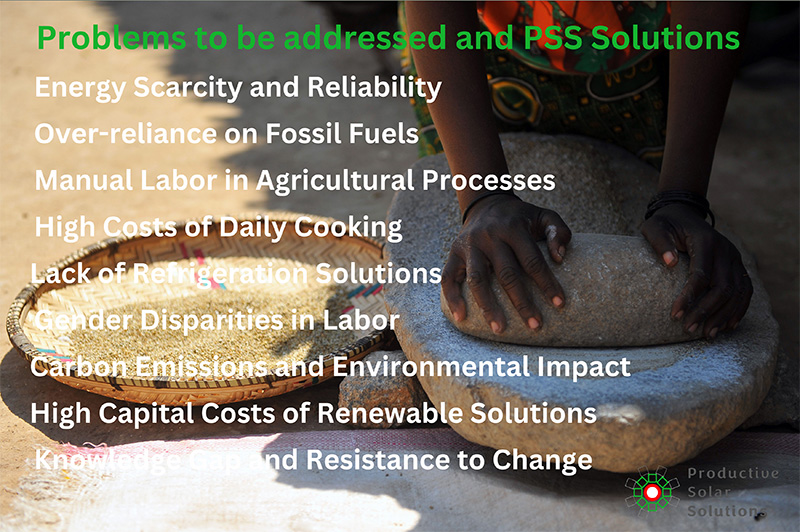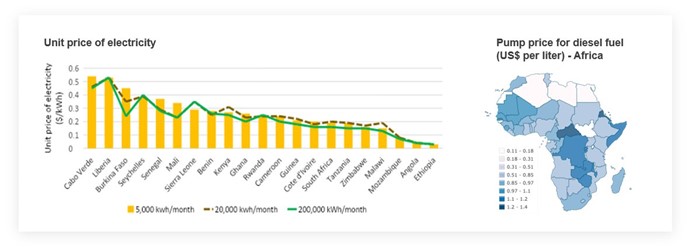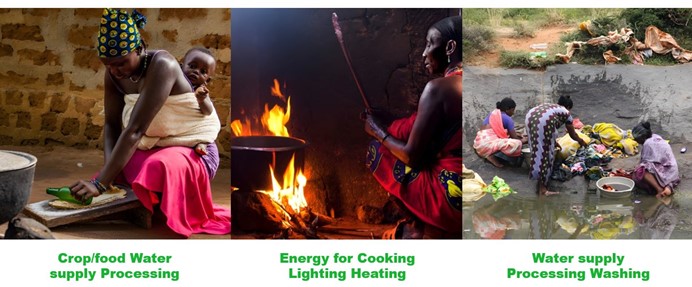
· Energy Scarcity and Reliability
In East Africa, particularly in the underserved regions of Kenya, access to reliable energy sources remains a pressing concern. Many communities are either entirely off-grid or experience frequent disruptions in their power supply. This lack of dependable energy hampers economic activities, hinders development, and burdens households substantially.
The PSSK Solution: PSSK is expanding its reach in delivering solar-powered systems for households and businesses. By harnessing the productive power of the sun, a reliable and abundant resource, communities can enjoy a consistent energy supply, reducing their dependence on erratic grid power or non-existent infrastructure.

· Over-reliance on Fossil Fuels
Traditional energy sources such as diesel and charcoal dominate the energy landscape. Their usage results in substantial carbon emissions and poses direct health risks, especially in poorly ventilated homes. Moreover, the fluctuating costs of fossil fuels strain household and business budgets.
The PSSK Solution: PSSK is expanding its reach in delivering solar-powered systems for households and businesses. By harnessing the sun's power, a reliable and abundant resource, communities can enjoy a consistent energy supply, reducing their dependence on erratic grid power or non-existent infrastructure.
· Manual Labor in Agricultural Processes
A significant portion of the populace, especially in rural areas, still relies on labor-intensive methods for agricultural processing. Tasks such as manually milling crops with sticks and stones are both time-consuming and physically exhausting. Such processes hinder productivity and often lead to post-harvest losses.
The PSSK Solution: Our solar-powered mills represent a revolutionary leap in agricultural processing. By mechanizing these processes, farmers and communities can significantly reduce labor hours, increase productivity, and minimize post-harvest losses.
· High Costs of Daily Cooking
For many households in Kenya, daily cooking expenses are a significant portion of their budget. With families spending around $0.70/day or $250/year on wood, charcoal, or gas for cooking, there's a dire need for more sustainable and affordable cooking solutions.
The PSSK Solution: Our innovative solar cookers are designed to offer a sustainable and economical solution to daily cooking needs. With a one-time investment or through PAYG models, households can reduce their recurring expenses on wood, charcoal, or gas, leading to substantial savings over time.
· Lack of Refrigeration Solutions
Spoilage of perishable goods, especially in the agricultural sector, results in massive economic losses for farmers and traders. The absence of refrigeration solutions for preserving fruits, vegetables, and seafood means that many products go to waste before reaching the market or consumer.
The PSSK Solution: Recognizing the urgent need for preservation, PSSK is introducing solar-powered refrigeration solutions. These units help drastically reduce spoilage, ensure fresh produce lasts longer, and assist traders in maximizing their profits.
· Gender Disparities in Labor
In many communities across East Africa, traditional gender roles have long dictated the tasks assigned to men and women. Women frequently bear the brunt of time-consuming, manual labor tasks such as cooking, laundry, and manual agricultural processing. This uneven distribution of labor not only perpetuates gender imbalances but also hampers women's participation in other economic, educational, or leisure activities. The continuous engagement in manual chores leads to physical exhaustion, reduced opportunities for skill development, and a perpetuation of gendered stereotypes.

The PSSK Solution: Recognizing the extensive time women spend on cooking with traditional, inefficient methods, PSSK's solar cookers provide an eco-friendly and efficient alternative. With reduced cooking times and eliminating fuel gathering or purchases, women can redirect their time to other productive activities, education, or relaxation. Manual laundry is a labor-intensive chore traditionally assigned to women. PSSK's solar laundromats alleviate this burden, providing a swift and efficient solution. This reduces physical strain and frees up substantial time, which can be used more productively. Agricultural processing, a task often falling on women, can be incredibly time-consuming. With PSSK's solar mills, the process is mechanized, reducing the required labor hours and enabling women to engage in other tasks or even value-added agricultural endeavors, such as packaging and marketing.
· Carbon Emissions and Environmental Impact
With most households relying on non-renewable sources for their energy needs, the collective carbon footprint is alarmingly high. This contributes to environmental degradation and exacerbates the challenges posed by climate change.
The PSSK Solution: All our solutions are grounded in sustainability. We're directly reducing the region's carbon emissions by championing solar energy. Additionally, our partnership initiatives, such as collaborating with Village Infrastructure Angels (VIA), focus on sustainable development and investigating methods of carbon offset mechanisms to reduce capital costs of solar productive further equipment.
· High Capital Costs of Renewable Solutions
While renewable energy solutions present a sustainable alternative, their initial setup costs often must be lowered for many households and businesses. This high barrier to entry prevents widespread adoption.
The PSSK Solution: PSSK is working on financing and partnership models to reduce the initial setup costs for end-users. By collaborating with local financial institutions, NGOs, and governments, we aim to make our products affordable and accessible to a broader audience. In addition, carbon offsets present a considerable opportunity to reduce global carbon emissions and the capital costs of equipment in developing markets.
· Knowledge Gap and Resistance to Change
In many communities, there needs to be more awareness or apprehension about transitioning to new technologies. This knowledge gap and natural resistance to change can hinder the adoption of innovative solutions, even when they present clear benefits.
The PSSK Solution: A robust community engagement model is at the core of our operations. We invest in training, awareness campaigns, and hands-on demonstrations to bridge the knowledge gap. By showing tangible benefits and involving communities in the adoption process, we ensure smoother transitions to our solar solutions.
Conclusion
The problems that PSSK seeks to address are multifaceted and deeply rooted in socio-economic, cultural, and technological challenges. Recognizing these issues is the first step in our mission. By offering innovative solar productive solutions tailored to the unique needs and challenges of East Africa, PSSK is poised to make a transformative impact, turning these challenges into opportunities for growth, development, and empowerment.
